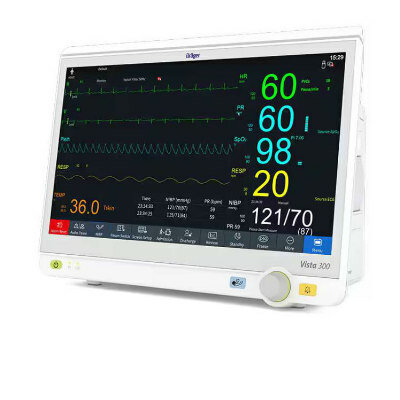Plant-Based Microrobots Could Conduct Minimally Invasive Biopsies 
|
By HospiMedica International staff writers Posted on 30 Oct 2023 |

Over the last decade, small and flexible robots have demonstrated potential for minimally invasive medical procedures. These robots should be able to change their shapes in complex ways to adapt to various conditions in real-world settings, including unpredictable situations. Researchers have now developed new smart materials that serve as the foundation for the next wave of tiny medical robots. These minuscule robots, with a maximum length of just one centimeter, can perform tasks like biopsies or transporting cells and tissues in a minimally invasive manner. They are made of advanced, non-toxic, bio-compatible hydrogel composites, containing plant-derived cellulose nanoparticles. These robots are capable of navigating through tight, fluid-filled spaces like those found within the human body.
For the research, scientists at University of Waterloo (Waterloo, ON, Canada) adopted a holistic approach to designing these microrobots. They focused on every aspect, from conception to the material's synthesis, and even how to control their movements. The hydrogel material can change its shape when influenced by external chemicals. With the use of cellulose nanoparticles, the researchers can program these shape alterations, a critical factor in making functional soft robots. Another remarkable feature of this material is its self-healing property. This means the material can be cut and rejoined without the need for glue or other adhesives, allowing for a wide range of shapes suited to various medical procedures. In addition, the material can be magnetized, enabling easy control of the robot's movement within the human body. To demonstrate this, the team successfully maneuvered the tiny robot through a maze using a magnetic field. The next phase of their research aims to shrink these robots even further, down to sub-millimeter sizes.
"In my research group, we are bridging the old and new," said Shahsavan, director of the Smart Materials for Advanced Robotic Technologies (SMART-Lab). "We introduce emerging microrobots by leveraging traditional soft matter like hydrogels, liquid crystals, and colloids."
"Chemical engineers play a critical role in pushing the frontiers of medical microrobotics research," Shahsavan added. "Interestingly, tackling the many grand challenges in microrobotics requires the skillset and knowledge chemical engineers possess, including heat and mass transfer, fluid mechanics, reaction engineering, polymers, soft matter science, and biochemical systems. So, we are uniquely positioned to introduce innovative avenues in this emerging field."
Related Links:
University of Waterloo
Latest Surgical Techniques News
- Pioneering Sutureless Coronary Bypass Technology to Eliminate Open-Chest Procedures
- Intravascular Imaging for Guiding Stent Implantation Ensures Safer Stenting Procedures
- World's First AI Surgical Guidance Platform Allows Surgeons to Measure Success in Real-Time
- AI-Generated Synthetic Scarred Hearts Aid Atrial Fibrillation Treatment
- New Class of Bioadhesives to Connect Human Tissues to Long-Term Medical Implants
- New Transcatheter Valve Found Safe and Effective for Treating Aortic Regurgitation
- Minimally Invasive Valve Repair Reduces Hospitalizations in Severe Tricuspid Regurgitation Patients
- Tiny Robotic Tools Powered by Magnetic Fields to Enable Minimally Invasive Brain Surgery
- Magnetic Tweezers Make Robotic Surgery Safer and More Precise
- AI-Powered Surgical Planning Tool Improves Pre-Op Planning
- Novel Sensing System Restores Missing Sense of Touch in Minimally Invasive Surgery
- Headset-Based AR Navigation System Improves EVD Placement
- Higher Electrode Density Improves Epilepsy Surgery by Pinpointing Where Seizures Begin
- Open-Source Tool Optimizes Placement of Visual Brain Implants
- Easy-To-Apply Gel Could Prevent Formation of Post-Surgical Abdominal Adhesions
- Groundbreaking Leadless Pacemaker to Prevent Invasive Surgeries for Children
Channels
Critical Care
view channel
Ingestible Smart Capsule for Chemical Sensing in the Gut Moves Closer to Market
Intestinal gases are associated with several health conditions, including colon cancer, irritable bowel syndrome, and inflammatory bowel disease, and they have the potential to serve as crucial biomarkers... Read moreNovel Cannula Delivery System Enables Targeted Delivery of Imaging Agents and Drugs
Multiphoton microscopy has become an invaluable tool in neuroscience, allowing researchers to observe brain activity in real time with high-resolution imaging. A crucial aspect of many multiphoton microscopy... Read more
Novel Intrabronchial Method Delivers Cell Therapies in Critically Ill Patients on External Lung Support
Until now, administering cell therapies to patients on extracorporeal membrane oxygenation (ECMO)—a life-support system typically used for severe lung failure—has been nearly impossible.... Read morePatient Care
view channel
Portable Biosensor Platform to Reduce Hospital-Acquired Infections
Approximately 4 million patients in the European Union acquire healthcare-associated infections (HAIs) or nosocomial infections each year, with around 37,000 deaths directly resulting from these infections,... Read moreFirst-Of-Its-Kind Portable Germicidal Light Technology Disinfects High-Touch Clinical Surfaces in Seconds
Reducing healthcare-acquired infections (HAIs) remains a pressing issue within global healthcare systems. In the United States alone, 1.7 million patients contract HAIs annually, leading to approximately... Read more
Surgical Capacity Optimization Solution Helps Hospitals Boost OR Utilization
An innovative solution has the capability to transform surgical capacity utilization by targeting the root cause of surgical block time inefficiencies. Fujitsu Limited’s (Tokyo, Japan) Surgical Capacity... Read more
Game-Changing Innovation in Surgical Instrument Sterilization Significantly Improves OR Throughput
A groundbreaking innovation enables hospitals to significantly improve instrument processing time and throughput in operating rooms (ORs) and sterile processing departments. Turbett Surgical, Inc.... Read moreHealth IT
view channel
Printable Molecule-Selective Nanoparticles Enable Mass Production of Wearable Biosensors
The future of medicine is likely to focus on the personalization of healthcare—understanding exactly what an individual requires and delivering the appropriate combination of nutrients, metabolites, and... Read more
Smartwatches Could Detect Congestive Heart Failure
Diagnosing congestive heart failure (CHF) typically requires expensive and time-consuming imaging techniques like echocardiography, also known as cardiac ultrasound. Previously, detecting CHF by analyzing... Read moreBusiness
view channel
Expanded Collaboration to Transform OR Technology Through AI and Automation
The expansion of an existing collaboration between three leading companies aims to develop artificial intelligence (AI)-driven solutions for smart operating rooms with sophisticated monitoring and automation.... Read more
















